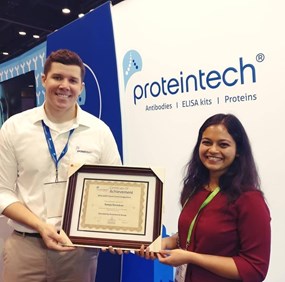AACR Travel Grant
Submit your abstract for the chance to win a travel grant for AACR 2022
Proteintech is proud to support researchers by offering 2 x $1000 travel grants to attend the 2022 AACR annual meeting in New Orleans, US.
Entry dates: 7th - 25th February 2022
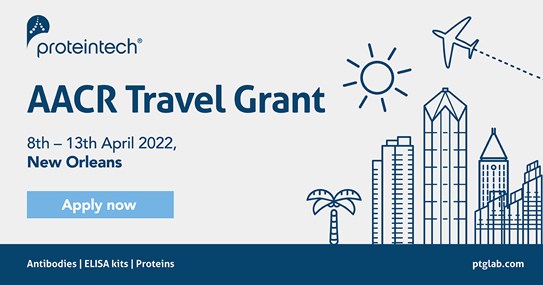
Who can apply?
The travel award is open to PhD students, lab managers and post-docs at university or research institutions in Europe and North America and awards $1000 to two attendees to assist with the cost of registration, accommodation and travel.
The two most interesting and innovative abstracts will be selected by a panel of scientists for the prize award.
Entries will be accepted between 7th – 25th February 2022. The winner will be announced on the 18th March 2022. Terms and conditions apply.
How do I apply?
Please submit your application using the below form:
AACR Travel Grant hall of fame
| 2020 Winners | |
|
Allison Fitzgerald Georgetown University, US Immunotherapy has shown efficacy across a wide range of cancers, but it has been ineffective in pancreatic cancer thus far due to the thick stroma of stellate cells protecting the tumor. O’Connell and colleagues found a potential weakness in this wall. They discovered that inhibition of fibroblast activation protein in stellate cells reduces the stroma and allows natural killer cells to infiltrate and kill the tumor. Inhibiting this target in combination with anti-PD-1 treatment enhances efficacy in their model. Their work suggests a crack in the wall to make immunotherapy more effective for pancreatic cancer patients.
|
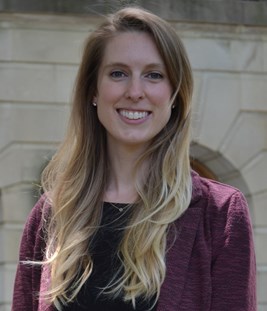 |
|
Guan-Yu Xiao UT Southwestern Medical Center, US Metastasis is the key event leading to mortality in cancer. A driver of this process in non-small-cell lung cancer (NSCLC) is upregulation of receptor tyrosine kinase (RTK) pathways. Guan-Yu Xiao and colleagues discovered that loss of endocytic machinery protein FCHSD2 alters trafficking of two RTKs - EGFR and MET - towards recycling and results in nuclear translocation of downstream effectors, resulting in significantly increased activity. Xiao’s work uncovers novel, surprising connections between trafficking and oncogenic signaling. |
 |
| 2019 Winners | |
|
Renzo Perales The University of Pennsylvania, US Great work in vivo showing a potent in vivo anti-tumor efficacy of TAMA (tumor associated mitochondria antigen)-based immunotherapy in combination with checkpoint inhibition in murine kidney tumor models. It is a very innovative work showing that TAMA antigens are targetable and can elicit a durable in vivo antitumor responses and therefore, they should be used in prophylactic or therapeutic IO approaches. It is an advanced work, based on previous results of the same team on TAMA-vaccination, and is highly applicable as a proposed therapeutic approach,at least for renal cancers. More importantly, they provide mechanistic insights as to how checkpoint shapes the tumor microenvironment to enhance the efficacy of the TAMA-vaccine. |
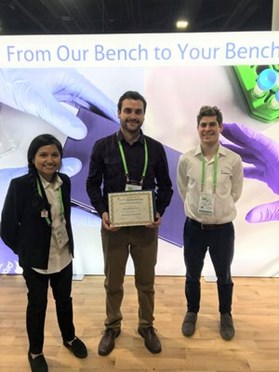 |
|
Uday Pratap University of Texas Health Science Center at San Antonio, US Choosing the best therapeutic strategy to combat cancer is a key hurdle for physicians. In the case of glioblastoma, there is a great need to discover biomarkers to predict the response to harsh chemo- and radiation therapy. Pratap and colleagues found that estrogen receptor beta functions as a tumor suppressor and sensitizes tumors to these therapies through inhibiting DNA damage repair. Their results suggest that estrogen receptor beta may not only be a useful biomarker, but it may also be useful as a drug target to improve response to therapy. |
|
| 2018 Winners | |
|
Ramya Ravindran University of Michigan, US Diffuse intrinsic pontine glioma (DIPG) is a fatal pediatric brainstem tumor with 100% fatality. These tumors are often treated on the assumption that they are molecularly similar to adult high-grade gliomas; however, they are distinct. Ramya and her colleagues have generated a genetically engineered mouse model of DIPG which represents a novel platform to study the molecular pathways underlying disease pathogenesis. An understanding of the functions of mutations that lead up to the disease can help to develop novel therapies for DIPG "I'm excited to be presenting at the AACR 2018 Conference and I'm thankful to Proteintech for their support in making this possible.” |
|
|
Samaresh Sau Wayne State University, US Programmed death ligand -1 (PD-L1) checkpoint inhibitors such as atezolizumab have been revolutionizing cancer treatment. However, the potential of these drugs has not been fully realized. To improve the stromal penetration of checkpoint inhibitors to tumors, Sau and colleagues have chemically linked a chemotherapeutic agent to atezolizumab for immune-chemo combination therapy. Their current data suggest that this approach may significantly improve the potency of checkpoint inhibitors for multiple cancer types. “I am delighted to network and develop cancer-killing smart drugs.” |
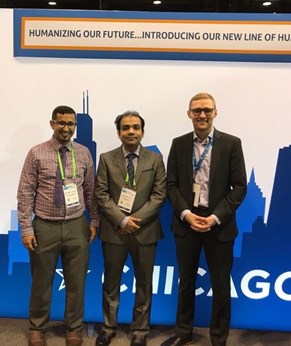 |
-
Only applicants from Universities and Research Institutions are eligible to take part in this competition.
-
This award will cover only the cost of registration, accommodation, and transport to the AACR 2022 meeting, to the total value of $1000. Any remaining balance available after these costs have been covered is not transferable and cannot be used for other expenses.
-
By taking part in the competition, you agree to take part in any marketing and PR activities that Proteintech deem necessary. These may include the following: An interview, featuring on Proteintech blog/website, and associated press releases.
-
The deadline for entries to be submitted is February 25th 2022. Any applications submitted after this date will not be eligible.
-
Applicants can only submit one entry. Any further entries will not be eligible. Applicants must complete the application form in full.
-
The applicant must be available to attend the AACR meeting in New Orleans between April 8th - 13th, 2022. The travel grant applies only to the AACR 2022 meeting. The reimbursement cannot be used for any other meeting.
-
The winning applicants will receive this travel grant via reimbursement from Proteintech Group.
-
The recipient must provide receipts for their AACR registration, accommodation, and travel to receive reimbursement.
-
The recipient will receive reimbursement within 7 days of proof of expense being obtained.
-
The reimbursement can only be paid to the individual or institution that originally paid for the travel expenses, registration and accommodation.
-
The winners will be decided by the Proteintech scientific writing team and an assisting group of scientific peers. The winning entries will be the abstract deemed most interesting by the panel.
-
Should the event have to be cancelled due to COVID-19 restrictions, the winner will receive their prize in the form of a research grant, instead of a travel grant.
-
The decision on which applicants win is at the discretion of Proteintech Group and their decision is final.
-
This competition is not affiliated with AACR in any way.
